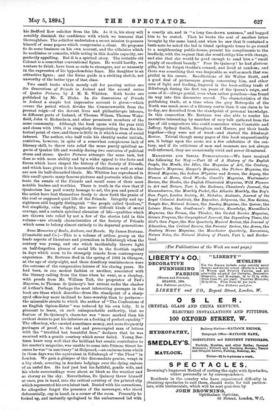Two small books which merely call for passing notice are
Biz Generations of Friends in Ireland and the second series of Quaker Pictures, by J. M. R. Whitten. Both books are published by Mr. E. Hicks. In Six Generations of Friends in Ireland a simple but impressive account is given—which covers the period which divides the Commonwealth from the present reign—of the devout lives and philanthropic labours, in different parts of Ireland, of Thomas Wilson, Thomas Wake- field, John G. Richardson, and other prominent members of the same community. Although the book opens with the year 1655 and closes with 1890, it is singularly disappointing from the his- torical point of view, and there is little in it which is even of social interest. The author, who half veils his identity under initials, contrives, however, in spite of a somewhat conspicuous lack of literary skill, to throw into relief the more purely spiritual as- pects of Quaker life and worship during two centuries of political storm and stress. Quaker Pictures attempts the same task, but does so with more ability and by a wider appeal to the facts and forces which have shaped the history of the Society of Friends, and which have given it its honourable traditions as well as what are now its half-discarded ideals. Mr. Whitten has reproduced in this small quarto many famous pictures and portraits which illus- trate the annals of the Friends and recall some of their most notable leaders and worthies. There is truth in the view that if Quakerism has paid scanty homage to art, the pen and pencil of the artist have lent themselves freely to show forth the praise of the real or supposed quiet life of the Friends. Integrity and up- rightness still happily distinguish " the people called Quakers," but simplicity, calm dignity, the more difficult kinds of moral courage, and a certain spiritual elevation of life—qualities which are thrown into relief by not a few of the stories told in this volume—are already characteristics of the Society of Friends which seem to belong almost entirely to its departed generations.






































 Previous page
Previous page